For National Apprenticeship Week we spoke to three people who went the apprentice route about the benefits of being paid while you learn
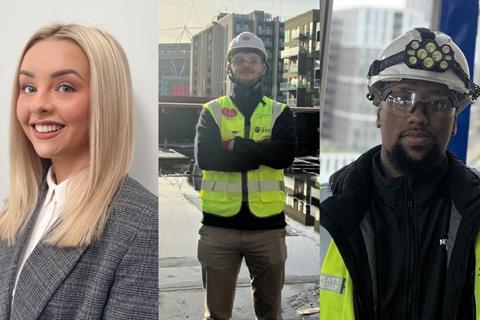
Why can’t Britain build anything any more? It’s the question many people have been asking over the past few months following the fiasco the cancellation of most of HS2. It is also a feeling which has been in the air for several years as the government has consistently failed to hit its target to build 300,000 homes a year despite being in the midst of a long-running housing crisis.
The truth is that Britiain will never be able to hit those kind of targets without a massive increase in the construction workforce. Around 225,000 more workers will be needed by 2027, according to the Construction Industry Training Board. Without it, projects will get slower, more expensive and the problems which only construction can solve will continue to grow.
>> Also read: Building The Future Commmission findings: Attracting, engaging and retaining the next generation
Today is the start of the 17th annual National Apprenticeship Week, a series of events across the UK promoting the benefits of apprenticeships as a way for young people to get a headstart in their careers without being saddled by the debts which can result from going to unviersity.
Many construction firms will be looking for essential new recruits up and down the country. Building spoke to three young people who have completed their apprenticeship or are currently on an apprenticeship course to find out why they chose this career path and how it’s going for them.
Abigail Grant, project controls, Turner & Townsend
Abigail started her project controls apprenticeship with Turner & Towsend in September 2019. Her work has seen her gathering and analysing project cost and schedule data at the Hinkley Point C nuclear power station in Somerset. She has now finished the four-year programme with two qualifications from the nuclear college in Cannington built for Hinkley Point.

Abigail had originally wanted to be an architect before setting her sights on engineering, but she never thought she would be able to work on such a large nuclear project. “I really couldn’t see myself welding or building or anything like that, so I didn’t actually think I could go down to Hinkley Point C.” This changed when she found the T&T apprenticeship programme and saw the opportunities available.
The actual scale of Hinkley Point is just what made it so interesting […] it’s so unique
When she first started four years ago there was little at the site except a giant hole dug 50m into the ground. Now the project is well under way, with recent pictures from the site showing the process of lifting a 245-tonne dome onto the top of the plant’s first reactor building. “The actual scale of Hinkley Point is just what made it so interesting,” Abigail says. “If you’re going to start your career anywhere, if you’re to start Hinkley it’s so unique and so big. And so technical.”
Despite the opportunity provided by apprenticeships to learn while being paid to do practical, onsite work, Abigail says there is not enough emphasis on the benefits of taking this path at school. “It’s very much ‘get your GCSEs, do your A levels and then you’re going to go to uni. I feel like that is how it set out for you and it’s basically all your taught”.
She had not been completely sure about going to university, partly because it felt like committing to a career path. With her apprenticeship, Abigail was able to chop and change, learn a range of disciplines and decide what best suited her.
Her main worry was whether she would miss out on the social aspect of university or lose her friends. The experience has taught her that this is not the case. “You don’t really get that very social thing that you get with uni, but at the end of the day, you do, just in a different way. You’re still going to have your friends that you do from school, you’re still going to make friends in the future. But then you also have your professional relationships as well.”
Mohamed Dahir, dryling, Platt & Reilly
Mohamed started his 18-month apprenticeship with drylining subcontractor Platt & Reilly in October last year. His work includes setting out partitions and putting up wall and ceiling boards in an apartment block scheme opposite Wembley stadium. He had been working as a security guard at construction sites and an asylum seeker hotel. “It was a dead end job,” he says. “There was no career path. I wanted to get into a trade and apprenticeship was the best way to do it.”
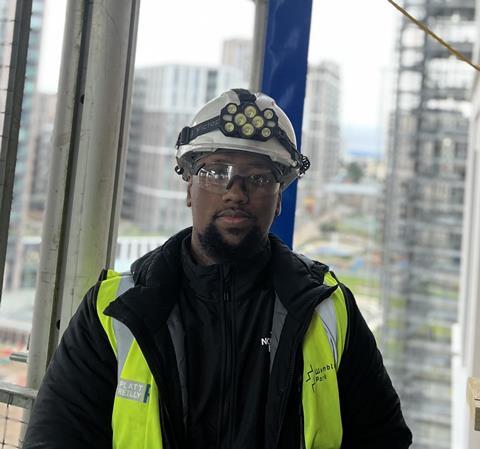
Dihar, who lives in Wembley, had seen all of the construction work going on around the stadium and wanted to find himself a role, which is how he came across Platt & Reilly. He went in for an interview, having already gained a CSCS card, which he had funded himself. I wanted to get into construction so I was like, if I get [the CSCS card] myself it shows that I’m actually committed.”
I’m a lot more active, doing different things every day. Before I had never even used a drill
He says what is doing now is much more varied than his previous security job. “I’d just be sitting down all day, not really doing a lot. With this, I’m a lot more active, doing different things every day. Before I had never even used a drill or anything like that. Now I’m used to it because I’m using it every day.”
Every couple of weeks Mohamed is paired with a different supervisor to help learn new skills. His plan for the future is to finish the apprenticeship, master the trade and go into a team leader or supervisor role. “With this, after I finish and I’m qualified, there’s so many different options that can go into, like management, or I can set up on my own and be self-employed. So there’s a lot more opportunities than working in security.”
Cameron Bond, quantity surveying, Sisk
Cameron is doing a quantity surveying apprenticeship with Sisk at a residential scheme in west London. He started the four-year programme in September 2022 at the age of 19 following a gap year to earn some money and travel with friends.
He applied to Sisk after seeing YouTube videos which described the company as having a friendly culture, something which he says he has since found to be true. “It’s very inclusive whenever, as an apprentice, you need support. And when you’ve been given work to do, it’s nice to have professionals around you that will take the time to teach you.”
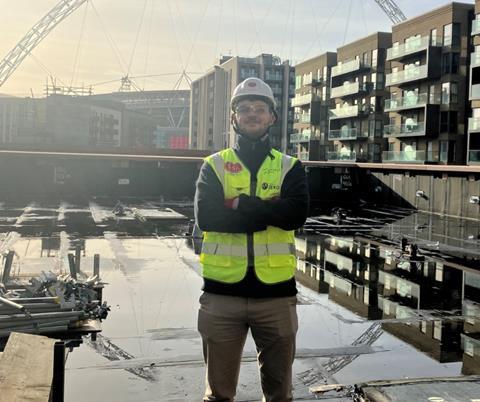
Cameron and another apprentice who started on the same day have each been given different packages to run. Cameron looks after fireproofing for the scheme, with his responsibilities including checking that the subcontractor has done their work correctly. “It’s on the job learning, and you earn while you learn as well, you’ve got no tuition fees and I feel like it’s good for your career progression,” he says.
If you want to get a head start on your career, apprenticeships are definitely the way to go
After the programme, Cameron has the option of taking a year-long chartership to gain accreditation from the RICS. This requires time spent working in the industry, something which those who choose to go to university might not have, meaning Cameron will effectively have a head start while being paid.
He had weighed up going to university but was put off by the cost of tuition, housing and needing a student loan. He says he is the only one of his friends who has done an apprenticeship and would “recommend it to anyone”.
“I don’t think there’s much awareness about apprenticeships. But the other thing is there is more of a social life with going to university, obviously. And if you want to do that, then that’s your thing. That’s fine. But if you want to get basically a head start on your career, apprenticeships are definitely the way to go.”
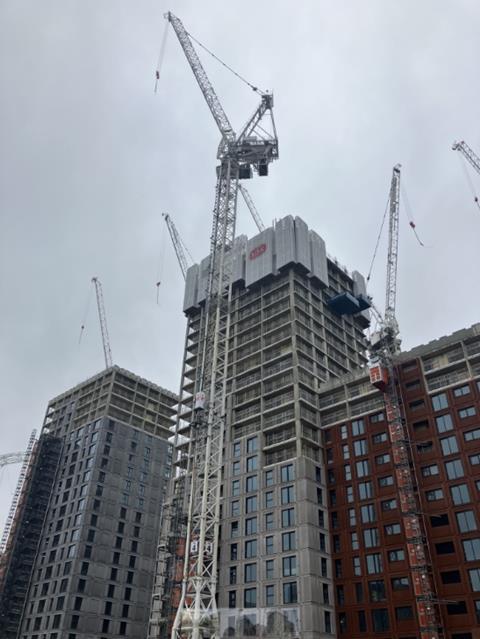
Improving skills in construction
>> Click here for all our coverage about skills and education for the Building the Future Commission, including accounts of professionals’ unusual routes into construction, and read our full recommendations for reform in our report available online here
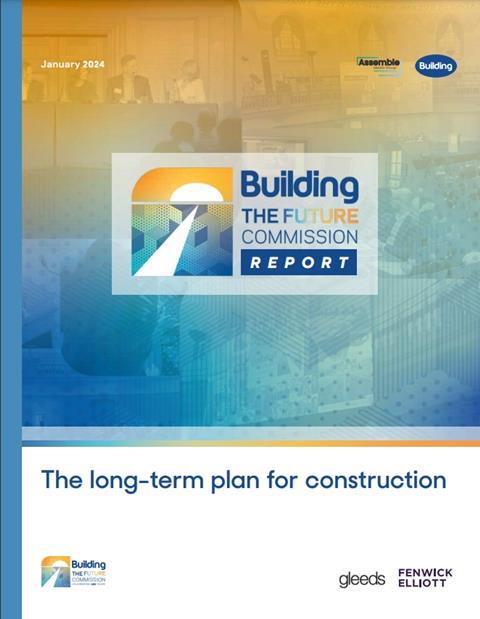


























No comments yet